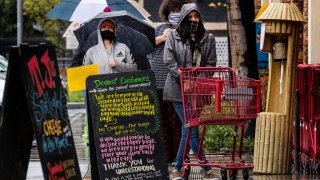
Funeral services, which had been on hold during the COVID-19 pandemic, will resume this week at most national cemeteries, including the one in Riverside, according to officials with the Department of Veterans Affairs.
Services had been reduced to burials and limited visitations since March 23, while larger services and military honors were suspended.
On Tuesday, the department plans to start contacting families that had to delay or limit services for loved ones and let them know the cemeteries are now fully open again.
"We believe we have a robust set of measures in place that will allow us to conduct committal and memorial services while protecting the health and safety of veterans, their families and our team members who serve them," VA Secretary Robert Wilkie said.
There will still be limits on the number of people at each service, physical distancing will be required for those who do not live in the same household, masks will be required and those who are ill will be urged to stay at home.
Meanwhile, Riverside County Supervisors Karen Spiegel and Manuel Perez said the county is prepared to move forward in the next Stage of de- regulation to reopen additional economic sectors amid the coronavirus pandemic.
"We will be excited to share how this will be implemented,'' Spiegel said Friday during an afternoon news briefing at the County Administrative Center in downtown Riverside.
Perez added that after the county has reviewed Stage 3 criteria of the governor's four-Stage reopening framework, released Friday, "we will be prepared for the reopening of all sectors throughout the County of Riverside."
The Board of Supervisors is expected to address the matter further during its meeting on Tuesday.
The California Department of Public Health and the governor's office established an action list for bars, day camps, gyms and schools to return to business, as well as paving the way for professional sports venues to restart operations.
"It is up to the local jurisdiction to make decisions regarding reopening specific sectors based upon the epidemiology and readiness of the county," according to a CDPH statement.
Currently, Riverside County, like most of the rest of the state, is in the "advanced" Stage 2 point of the de-regulation framework that was put in place by the three-dozen or so public health executive orders signed by the governor since mid-March.
Retail outlets, hair salons, dine-in restaurants and gaming facilities were among the businesses permitted to reopen two weeks ago in Stage 2.
"We are ready to work with businesses to reopen safely," Spiegel said. "Testing is really important. More people need to get tested."
One of the state's thresholds for progressing along the de-regulation path is for the number of residents screened for COVID-19 to increase. Currently, close to 5% of the county's aggregate population has been tested, according to county health officials.
County Department of Public Health Director Kim Saruwatari said that one criterion for a jurisdiction to continue toward full reopening is for the positivity rate in tests to remain below 8%. The county topped out at 8% on June 3 but was consistently below that figure prior to that time.
According to the Department of Public Health, 8,777 COVID-19 infections have been documented countywide. That compares to 7,486 a week ago -- a 17% increase.
The number of coronavirus-related hospitalizations has remained relatively flat, Saruwatari said, hovering just above or below 200 on a daily basis. The number of deaths attributed to virus-related complications stands at 355.
Those numbers reflect 474 new infections and 10 additional deaths in the past two days.
More than 70 patients from Imperial County were admitted to Riverside County hospitals during the past two weeks of May. Riverside University Health System spokesman Jose Arballo told City News Service last week that another 22 patients from Imperial County had either been transferred or walked into county hospitals since then, although he said it was unclear how many were still being treated.
Saruwatri produced, for the first time, statistics indicating racial breakdowns of COVID-19 infections.
She said blacks, who represent 6% of the county population, have experienced an infection rate of 4%. Whites, who represent 38% of the county population, have an infection rate of 15%, and Hispanics, who represent 47% of the county population, have an infection rate of 46%.
Spiegel reminded business owners of the availability of $45 million in grants to offset impacts from the shutdowns the governor ordered in mid- March. The federal Coronavirus Aid, Relief & Economic Security -- CARES -- Act money will translate to 4,500 individual businesses receiving up to $10,000 each for employee retention, capital investments and safety equipment purchases.
The supervisor said on Tuesday she will introduce a proposal for a similar aid package available exclusively for nonprofit organizations countywide.

